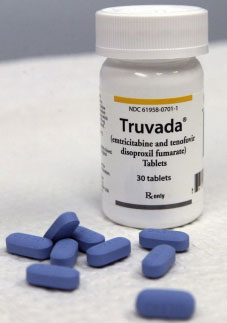
For couples wanting to conceive a child when one partner is HIV positive, the options have previously been limited to expensive assisted reproductive technologies, such as in vitro fertilization, or risking HIV transmission through unprotected intercourse. Now researchers at Drexel University College of Medicine are studying patient response to a once daily pill that prevents the spread of HIV infection in couples who are trying to get pregnant.
The study, taking place in four cities (Philadelphia, Boston, Baltimore and Chicago), is the first of its kind in the U.S. It will involve couples who have chosen to begin a method known as PrEP, which stands for pre-exposure prophylaxis. The once-daily pill Truvada was approved by the FDA in 2012 for this indication. It contains two medicines (tenofovir and emtricitabine) which work to keep the virus from establishing a permanent infection when someone is exposed to HIV through sex or injection drug use. When taken consistently, PrEP has been shown to reduce the risk of HIV infection by up to 92%.
“We know from efficacy trials that pre-exposure prophylaxis is an option to minimize transmission, but we need to find out what factors make PrEP feasible and acceptable to couples, as well as identify other factors that impact levels of adherence,” said Erika Aaron, CRNP, an assistant professor in the Division of Infectious Diseases and HIV Medicine at Drexel University College of Medicine, where she oversees a family planning clinic and coordinates a prenatal clinic for HIV-positive pregnant women in Drexel Medicine's HIV practice. Aaron is the principal investigator at the Philadelphia study site. Over the past two and a half years, she has helped 10 HIV-negative women with HIV-positive partners get pregnant via condomless intercourse while on PrEP. None have become infected with HIV and all have had healthy babies.
“People who have HIV desire to have children at similar rates as people who do not have HIV. Now that HIV is more of a chronic disease controlled by medications, and people are living normal lives, there are many couples who desire pregnancy,” said Aaron. “It is important that we let people who are at risk of getting HIV know that PrEP is an option and help them make informed decisions about such important life choices.”
This is an observational study, in which standard of care is provided and the successes are then observed. The woman who is HIV-negative is prescribed PrEP along with proper risk reduction counseling and clinical monitoring. The partner who is HIV-positive is on effective HIV medications. Once pregnancy is achieved, the woman can opt to continue PrEP, which is safe in pregnancy.
The study is expected to last one to two years. Drexel has already started enrolling participants at the Philadelphia site. Anyone interested in participating should call 215.762.6826.